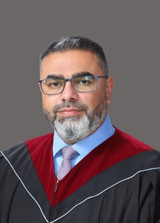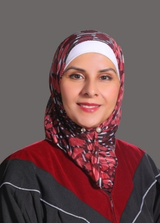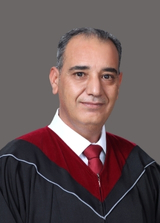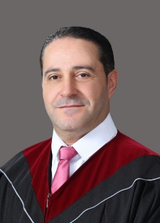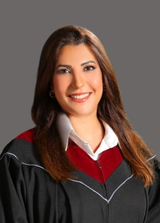Department Welcome
Academic Members
List and details of academic members of the department.
Study Plan
Details about the study plan and curriculum.
Course Curriculum: Credit Hours
General Education Courses
General Education Curriculum Courses
List of Competencies
Basic Science & Humanities - List of Competencies
Knowledge
- Understanding essential facts in related topics.
- Comprehend basic concepts in related fields and their applications.
- Introducing and relating principles and theories.
- Clarifying sciences and humanities terminology in related fields.
Practical Skills
- Enhance oral, written and communication skills.
- Applying creative and critical skills.
- Develop interpersonal skills.
- Use of a Learning Management System (LMS) in the learning process to create and deliver content and monitor student participation and assessment.
Thinking Skills
- Enhance computer skills to solve and apply theoretical concepts in real life.
- Recognize, analyze, and apply quantitative and qualitative concepts in real-life models.
- Understand scientific reasoning for different problems and concepts.
Other Skills
- Promote critical thinking in solving and applying problems and concepts.
- Intellectual and independent creativity in reasoning learning natural sciences topics.
- Recognize and apply effective and useful interaction in complex problems.
Course Description
Detailed descriptions of the courses offered.
| 900103 | 1 CH. | Prerequisite | Co-requisite | |
|---|---|---|---|---|
| 0 | 2 | - | - | |
| This course covers basic to advanced swimming techniques, including freestyle, backstroke, breaststroke, and butterfly, while emphasizing water safety and rescue skills. Students will improve endurance, coordination, and confidence in the water through structured practice and hands-on guidance. Suitable for all levels, the course tailors instruction to individual progress. | ||||
| 900119 | 1 CH. | Prerequisite | Co-requisite | |
|---|---|---|---|---|
| 1 | 0 | - | - | |
| This course equips students with essential life skills, including effective communication, decision-making, and stress management, to navigate personal and professional challenges. Through practical exercises and real-life scenarios, students will build self-awareness, resilience, and problem-solving abilities. The course fosters critical skills for personal growth and adaptive success. | ||||
| 900122 | 1 CH. | Prerequisite | Co-requisite | |
|---|---|---|---|---|
| 1 | 0 | - | - | |
| This course provides knowledge of entrepreneurship, innovation, and the creation and launch of new ventures. It examines the entrepreneur?s approach to life skills necessary for that approach to create value. Students will be able to recognize and evaluate entrepreneurial opportunities | ||||
| 900123 | 1 CH. | Prerequisite | Co-requisite | |
|---|---|---|---|---|
| 1 | 0 | - | - | |
| This course explores principles of effective leadership and the importance of social responsibility in various contexts. Students will develop skills in ethical decision-making, team dynamics, and community engagement, emphasizing the role of leadership in driving positive social impact. Practical activities foster a commitment to responsible and inclusive leadership. | ||||
| 900111 | 3 CH. | Prerequisite | Co-requisite | |
|---|---|---|---|---|
| 3 | 0 | - | - | |
| This course provides knowledge about the military, the role of the Jordan armed forces in defending the country, and the military's role in development and community service. The course is taught with lectures and field trips. (Military Science course (3 credit hours) is compulsory for Jordanian students and elective for others, and counts among the credit hours required for graduation, but does not count for the purpose of calculating the cumulative average. Non-Jordanian students who opt not to study it are required to study any other course instead) | ||||
| 900120 | 3 CH. | Prerequisite | Co-requisite | |
|---|---|---|---|---|
| 3 | 0 | 0900097 or passing the placement test. | - | |
| This course enhances students? essential practical skills in Arabic reading, writing, listening, and speaking, through studying selected literary texts. Emphasis is placed on the structure of the Arabic sentence, its most common derivatives, and its most common artistic forms | ||||
| 900121 | 3 CH. | Prerequisite | Co-requisite | |
|---|---|---|---|---|
| 3 | 0 | 0900098 or passing the placement test. | - | |
| This course introduces fundamental Arabic language skills, focusing on practical communication in reading, writing, speaking, and listening. Students will engage in interactive exercises to build vocabulary, understand basic grammar, and develop conversational proficiency for everyday situations. Tailored for beginners, the course fosters cultural understanding and confidence in Arabic communication. (Alternative to 0900120 for non-native speakers of Arabic) | ||||
| 900130 | 3 CH. | Prerequisite | Co-requisite | |
|---|---|---|---|---|
| 3 | 0 | 0900099 or passing the placement test. | - | |
| This course helps students enhance their ability to communicate in English through the four basic skills ? reading, writing, listening and speaking. It provides grammatical forms and structures that are used in real-life situations. Stimulating and informative passages are included to hone students? reading comprehension skills and widen their horizons. There are also writing exercises that are relevant to students? experiences. | ||||
| 900131 | 3 CH. | Prerequisite | Co-requisite | |
|---|---|---|---|---|
| 3 | 0 | 900130 | - | |
| This course is a continuation of English Communication Skills (1). It further enhances students? basic language skills: reading, writing, listening, and speaking. It provides essential information about grammatical forms and structures used in real communicative situations and relevant to the student?s immediate life, building their fluency. Stimulating and informative passages are selected to improve student?s reading comprehension ability and widen their horizons. Exercises and semi-guided paragraphs and essays are used to improve their writing skills, in addition to listening skills through audio CDs, and online practices. | ||||
| 900102 | 3 CH. | Prerequisite | Co-requisite | |
|---|---|---|---|---|
| 3 | 0 | - | - | |
| This course provides general knowledge in fitness methodologies within students? lifestyles in order to maintain healthy life style. This course also addresses basic concepts in racket sports such as (tennis, Badminton, table tennis & Squash) | ||||
| 900113 | 3 CH. | Prerequisite | Co-requisite | |
|---|---|---|---|---|
| 3 | 0 | - | - | |
| This course develops skills for effective communication across diverse cultural and social contexts. Students will learn strategies to improve interpersonal relationships, manage conflicts, and adapt communication styles to foster understanding and inclusivity. Emphasis is placed on cultural sensitivity and the impact of communication on global interactions. | ||||
| 900117 | 3 CH. | Prerequisite | Co-requisite | |
|---|---|---|---|---|
| 3 | 0 | - | - | |
| This course provides students with an understanding of civic life, politics, and government. It also raises the knowledge and the analysis of Jordan?s Constitution and the different branches of government, prevalent political ideologies, and civic constitutional rights. It also develops an understanding of civic values and be able to appreciate freedom of speech and engage with those who have different opinions to them. Students will also develop an understanding of civic agency such as the importance to vote, volunteering, and engaging in civic responsibility in their own communities. | ||||
| 900118 | 3 CH. | Prerequisite | Co-requisite | |
|---|---|---|---|---|
| 3 | 0 | - | - | |
| This course enhances students? practical oral, written and communication skills in both cultural contents which extends beyond students? classroom into their local communities through presentations and discussion papers in class, and an introduction to speech communication which emphasizes the practical skill of public speaking, including techniques to reduce speaker anxiety, and the use of visual aids to enhance speaker presentations. It prepares students to succeed in typical public speaking situations and to provide them with the basic principles of organization and skills needed for effective speeches | ||||
| 900124 | 3 CH. | Prerequisite | Co-requisite | |
|---|---|---|---|---|
| 3 | 0 | - | - | |
| This course provides basic knowledge of human rights, conceptual and historical foundations, international legal instruments, frameworks, and institutions aimed at advancing human rights worldwide. It also enhances communication skills dealing with current debates and issues within the field of human rights as a by-product of larger questions of cultural relativism vs. universality, collective vs. individualistic society, and their applicability on a national level. | ||||
| 900140 | 3 CH. | Prerequisite | Co-requisite | |
|---|---|---|---|---|
| 3 | 0 | - | - | |
| This course provides understanding conceptual basis of the visual arts, and arts terminology. Variety of styles will be introduced. It provides Knowledge of historical western and non western cultural styles of arts in a variety of media, including architecture. Visual aspects of visual art will also be emphasized. | ||||
| 900141 | 3 CH. | Prerequisite | Co-requisite | |
|---|---|---|---|---|
| 3 | 0 | - | - | |
| This course acquaints students in understanding the elements of music and the primary musical periods of traditional Western European classical music. It introduces essential knowledge and a brief overview of the major composers and their music through class lectures, listening to musical examples in class, reading the text, listening to musical examples provided on the student CD?s or recordings, actively engaging in group discussions, attending live concerts of suggested performances, and completing research papers and/or oral presentations pertinent to the course material. | ||||
| 900106 | 3 CH. | Prerequisite | Co-requisite | |
|---|---|---|---|---|
| 3 | 0 | - | - | |
| This course introduces key concepts in statistics, covering data collection, analysis, probability, and interpretation. Students will learn to apply statistical methods to real-world problems, enhancing skills in data visualization and critical evaluation. The course emphasizes practical application in various fields, fostering quantitative reasoning and decision-making skills. | ||||
| 900114 | 3 CH. | Prerequisite | Co-requisite | |
|---|---|---|---|---|
| 3 | 0 | - | - | |
| This course aims to broaden and deepen students? understanding of the foundations of Western Civilization, while at the same time creating an awareness of the multiple regional influences and cultural interactions that shaped these foundations. It aims to do that primarily through a study of some of the ?Great Books? that participated in shaping Western thought. The primary texts will be discussed to enable the students to personally interact with them imaginatively as well as critically. | ||||
| 900115 | 3 CH. | Prerequisite | Co-requisite | |
|---|---|---|---|---|
| 3 | 0 | - | - | |
| This course is interdisciplinary and aims to explore essential ethical questions related to morality, the individual and society, moral relativism versus moral absolutes. The field of social ethics is concerned with these questions and emphasizes the application of moral reasoning and evidence to address real-world problems. The course also covers the significant philosophical underpinnings of ethics and cultural aspects. The course aims to enhance students' understanding of morality and ethical communication skills and equip them to become responsible, engaged, and participatory citizens who value and conserve the earth's resources and diverse cultures. | ||||
| 900133 | 3 CH. | Prerequisite | Co-requisite | |
|---|---|---|---|---|
| 3 | 0 | - | - | |
| An overview of research methodology, including understanding basic concepts used in quantitative and qualitative research methods. It enhances students? practical and thinking skills in research (quantitative and qualitative) and how to use the appropriate tools for testing, data collection, analysis, and interpretation. The course covers the following topics: research methods; using research tools, testing hypotheses, collecting and analyzing data, presenting results, and writing research manuscripts such as reports, papers, and proposals for research projects. | ||||
| 900150 | 3 CH. | Prerequisite | Co-requisite | |
|---|---|---|---|---|
| 3 | 0 | - | - | |
| This course provides a foundational understanding of economic principles, including supply and demand, market structures, and the role of government in the economy. Students will explore how economic forces impact individuals, businesses, and society, applying core concepts to real-world issues. Emphasis is placed on analytical thinking and informed decision-making. | ||||
| 900116 | 3 CH. | Prerequisite | Co-requisite | |
|---|---|---|---|---|
| 3 | 0 | - | - | |
| This course focuses on issues involving medical care and biotechnology. The course subjects extend to other areas where human life and death are involved such as euthanasia, abortion, genes, genomes, and health care. The course examines these issues ethically from many sides, weighing the reasons people have a certain mindset with considerations towards forming a well-supported position and creating a world in which all can live. The course seeks to develop moral wisdom, understand essential facts, and have moral virtue. | ||||
| 900171 | 3 CH. | Prerequisite | Co-requisite | |
|---|---|---|---|---|
| 3 | 0 | - | - | |
| This course provides knowledge of the essential facts and the philosophy in advances of science and technology and their impact on society and social behavior. It analyzes social dimensions of recent advances in areas such as nutraceuticals, recreational drugs, and radiation. Emphasis on group discussions, practical communications skills, and team work are encouraged. | ||||
| 900172 | 3 CH. | Prerequisite | Co-requisite | |
|---|---|---|---|---|
| 3 | 0 | - | - | |
| This course provides environmental knowledge of climate change and covers the natural renewable and non-renewable cycles of energy available on earth. Historical energy use and conventional energy resources are presented, along with associated environmental problems such as air pollution and mining and environmental impacts such as global warming and ozone depletion. | ||||
| 900180 | 3 CH. | Prerequisite | Co-requisite | |
|---|---|---|---|---|
| 3 | 0 | 0900096 or passing the placement test | - | |
| This course introduces general knowledge and critically analyzes the internet, new media, and digital technologies and the roles they play in contemporary society, culture, business, arts, and everyday life. It enhances students? computer skills in exploring the interface between emerging new media technologies and cultural practices involving information, communication, knowledge, identities and power and build a rich understanding of how new technologies are generated, circulated, and consumed. | ||||
| 900185 | 3 CH. | Prerequisite | Co-requisite | |
|---|---|---|---|---|
| 3 | 0 | - | - | |
| This course provides quantitative and qualitative essential knowledge of the nature of planetary systems, in particular our solar system, as well as the nature of the stars, the interstellar medium, the galaxies, and the universe, as determined from a variety of astronomical observations and practical real-life models. | ||||
| 900190 | 3 CH. | Prerequisite | Co-requisite | |
|---|---|---|---|---|
| 3 | 0 | - | - | |
| This course introduces general knowledge and critically analyzes the internet, new media, and digital technologies and the roles they play in contemporary society, culture, business, arts, and everyday life. It enhances students? computer skills in exploring the interface between emerging new media technologies and cultural practices involving information, communication, knowledge, identities and power and build a rich understanding of how new technologies are generated, circulated and consumed. | ||||
| 903101 | 3 CH. | Prerequisite | Co-requisite | |
|---|---|---|---|---|
| 3 | 0 | - | - | |
| This course covers the essential knowledge and practical analytical skills in functions, algebraic and transcendental, graphs and the effects of translations and scaling, limits (with intuitive approach) and continuity, the derivative various meanings, main rules and applications, approximation and graph sketching, definite and indefinite integration, the substitution rule and the fundamental theorem of calculus. | ||||
| 903102 | 3 CH. | Prerequisite | Co-requisite | |
|---|---|---|---|---|
| 3 | 0 | 903101 | - | |
| The course should provide the students with the knowledge about some applications of definite integrals and integrals of transcendental functions. It also introduces more techniques of integration, then infinite sequences and series. Finally, the course gives an introduction to polar coordinates and parametric equations. | ||||
| 903281 | 3 CH. | Prerequisite | Co-requisite | |
|---|---|---|---|---|
| 3 | 0 | - | - | |
| The course provides understanding of the basic concepts in descriptive statistics and covers basic concepts and application of probability, discrete and continuous random variables, probability distributions, expected values, sampling distributions, point estimation, confidence intervals, hypothesis testing and simple linear regression models. | ||||
Program Learning Outcomes
Basic Science & Humanities Program Learning Outcomes
Student learning outcomes describe what students are expected to know and be able to do by the time of graduation. By the time of graduation, the Basic Science & Humanities Department's program must enable students to attain an ability to:
PLO1: Rational and Practical Skills Acquire the intellectual and communicative skills that are needed to succeed in the academic environment and to address globally complex challenges. This includes written and oral communication skills and quantitative and qualitative reasoning for complex and refined arguments.
PLO2: Civic and Global Leadership Recognize the diversity of different societies, locally and internationally, in terms of gender, race, religion, ethnicity, and age, and demonstrate the skills and knowledge gained to lead, recognize, apply and establish effective and useful interactions in crisis.
PLO3: Knowledge of Human Cultures Acquire knowledge from humanities, environmental and social sciences, in addition to arts to better understand ecology.
PLO4: Understanding of the Physical and Natural World (STEM Skills) Acquire creativity, knowledge, and skills learned from Natural Sciences (Biology, Chemistry, Mathematics, and Physics) in order to develop an interdisciplinary, diverse, and applied approach to the natural environment and an understanding of scientific reasoning and integration of latest technology.



